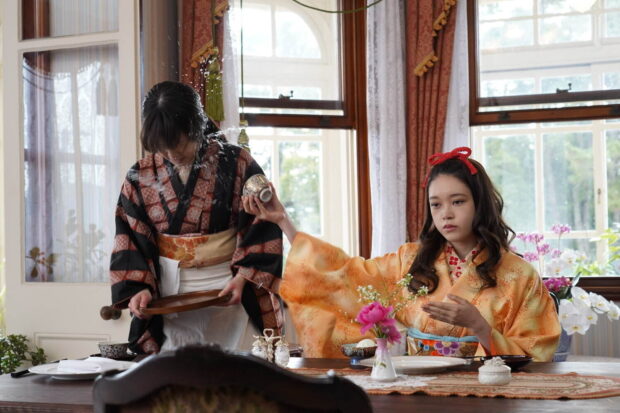Director Ayuko Tsukahara is certainly no stranger to fantasy films or romances, having worked extensively on dramas like Dearest, Why I Dress Up for Love, and Meet Me After School. With AS LONG AS WE BOTH SHALL LIVE (わたしの幸せな結婚), based on Akumi Agitogi’s light novel series My Happy Marriage, here Tsukahara combines both.
Set in an alternate 19th century Japan, Miyo (Mio Imada) is the eldest daughter of the respected Saimori clan. Born without the supernatural powers that have protected the clans for generations, she shares the fate of Cinderella by being mistreated by her stepmother and universally beloved stepsister for years.
At least, that is, until she is arranged to be marriage to Kiyoka (Ren Miguro), heir of the fearsome Kudo family. With a reputation for being cruel, each of his previous would-be brides have fled within days of arriving at his place. Yet Miyo is different, and she not only discovers that he is capable of kindness, but that she is capable of much more than she ever believed as well.

There’s a very particular Venn diagram of fandom that this slips into: fantasy romances that begin with a toxic relationship and end with literal magic. There’s a scene early on where Miyo takes the initiative to cook for Kiyoka, but is dismissed and rebuffed by him. She ultimately takes it as a sign to try and crack through that gruff exterior. So yes, it’s not just Cinderella but Beauty and the Beast, the ultimate Stockholm Syndrome tale.
In the plus column, it sure is a pretty film to look at. As it’s ostensibly a period piece set in the Meiji Restoration era, some gorgeous set and costume designs convincingly immerse us in another time and place. At various times, powers would manifest in simple but effective light displays that neither clashed with nor overwhelmed the period setting.
Yet given that these fantasy elements are sparingly used, they may not feel stylistically out of place but they certainly don’t always work in the narrative. At times it feels they are only remembered when the plot calls for it, especially during the climactic scenes. Swinging between tortured sequences and randomly manifesting powers, there were honestly just points where I simply had no idea what was going on.
A post-credits scene, one that probably means more to fans of the original novels than it did to this viewer, suggests that there is more to come. Which makes sense, but given the presence of serial director Tsukahara, one can’t help but feel this would ultimately work much better as an anime series (which commenced in July 2023 on Netflix) than as films.

2023 | Japan | DIRECTOR: Ayuko Tsukahara | WRITERS: Tomoe Kanno | CAST: Ren Meguro, Mio Imada, Keisuke Watanabe, Ryusei Onishi | DISTRIBUTOR: Fantasia Film Festival | RUNNING TIME: 115 minutes | RELEASE DATE: 20 July – 9 August 2022 (Fantasia)

